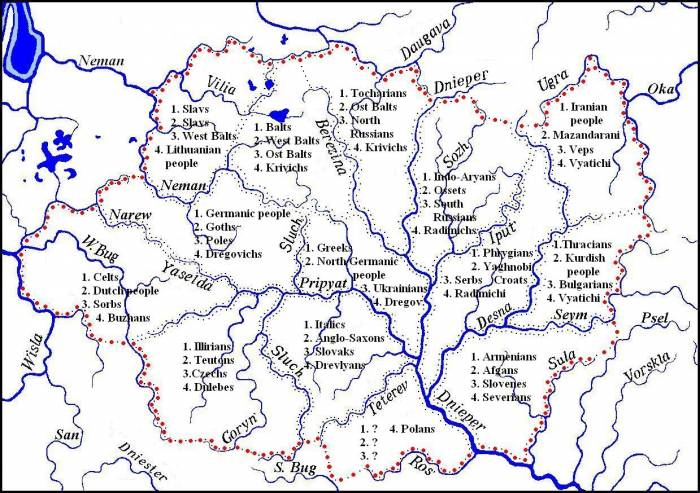
The Substratum Phenomena in Ethnogenic Processes
Map of Ethno-Generating Areas in Eastern Europe illustrating alternation of substratum influences.
At different time parent languages were separated in dialects which later developed in individual languages on the same areas. Prent-day names of people were given their ancestors. Number on areals corresponds such periods: 1. Uprising Indo-European languages 2. Uprising of Germanic and Iranian languages. 3. Formation of Slavic languages. 4. East Slavic tribes durind Kiev Rus'./span>
During the studies of ethnogenic processes in the East Europe it has been noticed, that the certain areas are characterized by especial, though also not numerous language culture features which continue existing even at changes of the language of the majority of the population. This is a manifestation of the so-called superposition principle which is that during the relocation of people some group of them stayed on their residences, and new population of other cultural and linguistic traditions stratifies on them. In this case, the aliens fall under spiritual influence of the remains of the previous population. New settlers perceive from them existing place names, new words necessary in new life conditions and often liked customs and ceremonies. /span>
Superposition principle is clearly seen in the case of Ukraine. A large number of Ukrainian place names can be explained by means of the German, Iranian, Slavic, Turkic languages. Information on this topic is covered in the section Prehistoric Place Names of the Eastern Europe. Especially great cultural influence on the Ukrainians was made by ancient Bulgars, they also Scythians, which are the ancestors of modern Chuvashуы. Ukrainian Surnames of Hypothetical Bulgarian Origin give reason to assume that the Bulgars were living in close proximity with the Ukrainians for a long time, until the historical time. Other we were to think that some names appeared more than two thousand years ago. Obviously Bulgars were of part of "black hoods," among which were Turkic tribes of Torqs, Berendeys, Pechenegs, Kovuys. Chronicles evidences of them extend to the 13th century, then their remains, obviously, scattered among the Ukrainian population. Therefore Bulgar origin of some Ukrainian surnames has nothing surprising. /span>
Exactly knowing what Ukrainian territory was inhabited by Bulgars in prehistoric times, you can carry targeted searches for cultural and social relations between Ukrainians and Chuvashes. Such connections can be found in the folk song, dance, embroidery, handicrafts. Discovered analogies can characterize not only the continuity and interaction of cultures but also to estimate the time of occurrence and source of borrowing new beliefs, customs, and the timeframe for their existence. /span>
The importance of linguistic substratum was long disputed by many linguists, including Julius Pokorny, since the influence of the language of the previous population on the language of aliens affected often only in few generations after the invasion and conquest that was seemed impossible. Later, agreeing with the phenomenon of the influence of the substrate, Pokorny explained this delay by the fact that the conquered people stayed on lower social levels until some time and their language was neglected by the higher strata of society, most of whom were strangers. However, after the infiltration of the local population to invaders, relation to their language was changing and began its influence despite it may could lost some its features. This, in particular, could explain the dismemberment of the Latin language under the influence of different substrate in Spain, France, the Balkans (POKORNY JULIUS, 1968, 178-180). /span>












